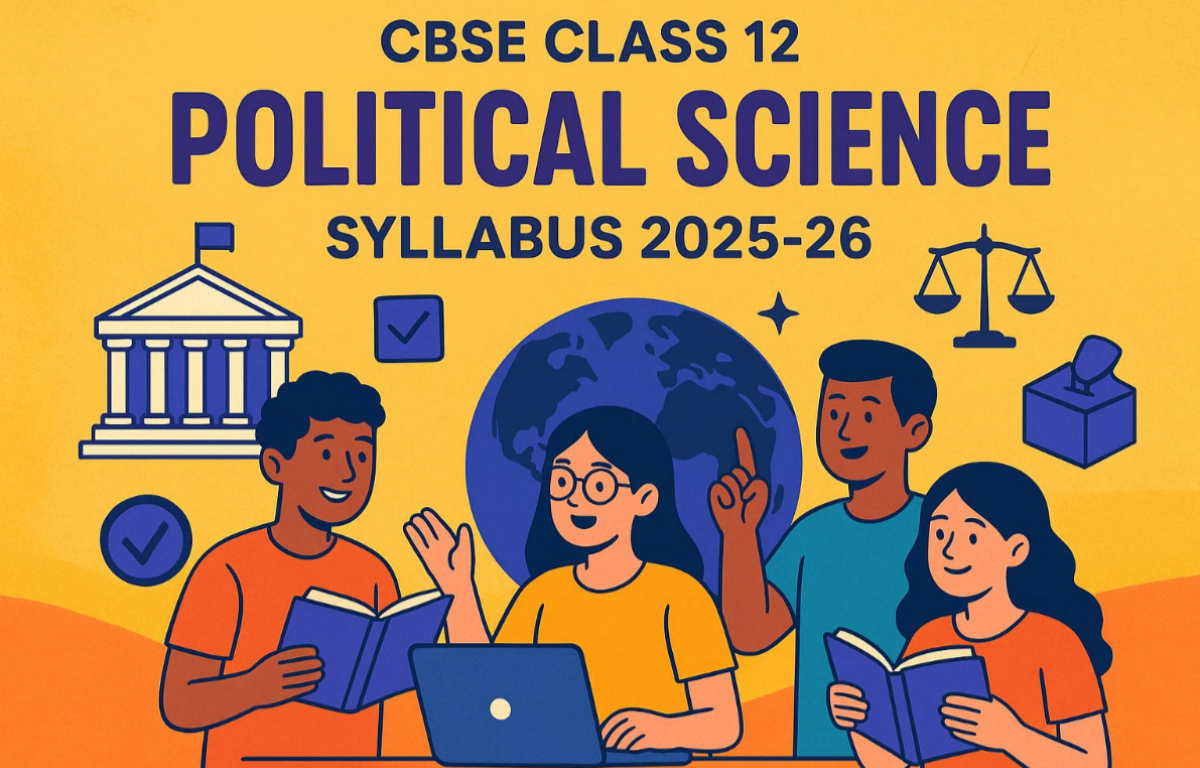The CBSE Class 12 Political Science Syllabus 2025-26 has been recently released by the Central Board of Secondary Education, giving students a guide to study for their exam. The syllabus has popular topics like democracy, constitution, political systems, contemporary world politics, and India’s influence in world affairs.
The syllabus helps to develop both theoretical knowledge and skills for analysis, giving students the tools to have real-life connections to political concepts. All the Arts stream students with Political Science as their major subject can now check the latest CBSE Class 12th syllabus for the academic year 2025-26 at the official website of the Central Board, or can also access their detailed syllabi in the article below.
CBSE Class 12 Political Science Syllabus 2025-26
The CBSE Class 12 Political Science Syllabus is divided into 2 parts, i.e., the first Part: Contemporary World Politics, and the second Part: Political in India Since Independence. It prepares students for further studies, civil services, and competitive exams. By following this syllabus, students will be able to plan their studies effectively and develop a sound footing in comprehending political study concepts, governance, and international relations. Students can check the chapter-wise political science syllabus along with the marking scheme in the table shared below:
CBSE Class 12th Political Science Chapter-wise Syllabus
| CBSE Class 12th Political Science Syllabus | ||
| Chapter No. | Chapter Name | Marks Allotted |
| PART A-CONTEMPORARY WORLD POLITICS | ||
| Chapter 1 | The End of Bipolarity | 06 |
| Chapter 2 | Contemporary Centres of Power | 06 |
| Chapter 3 | Contemporary South Asia | 06 |
| Chapter 4 | International Organizations | 06 |
| Chapter 5 | Security in the Contemporary World | 06 |
| Chapter 6 | Environment and Natural Resources | 06 |
| Chapter 7 | Globalisation | 04 |
| PART A – Total | 40 | |
| PART B-POLITICS IN INDIA SINCE INDEPENDENCE | ||
| Chapter 1 | Challenges of Nation-Building | 06 |
| Chapter 2 | Era of One-Party Dominance | 04 |
| Chapter 3 | Politics of Planned Development | 02 |
| Chapter 4 | India’s External Relations | 06 |
| Chapter 5 | Challenges to and Restoration of the Congress System | 04 |
| Chapter 6 | The Crisis of Democratic Order | 04 |
| Chapter 7 | Regional Aspirations | 06 |
| Chapter 8 | Recent Developments in Indian Politics | 08 |
| PART B – Total | 40 | |
Detailed CBSE Class 12 Political Science Syllabus 2025-26
It is very important for Class 12 learners to be aware of the Latest Political Science syllabus to know the newly added topics and the still important ones, with the weightage per Unit and how the exam pattern looks. With the Right syllabus, learners are able to craft a study routine and prioritise the important topics of the syllabus, while excluding any irrelevant and outdated topics.
Along with the syllabus, learners should also refer to NCERT books, previous year question papers, and sample papers in preparation to ensure effective preparation. Such resources help to sharpen writing skills and develop confidence in the learner. Learners can look at the detailed syllabus below for full guidance.
PART A-CONTEMPORARY WORLD POLITICS
Chapter 1: The End of Bipolarity
Topics to be focused:
a) The Soviet System
b) Gorbachev and the disintegration
c) Causes and Consequences of the Disintegration of the Soviet Union
d) Shock Therapy and Its Consequences
e) New entities in world politics
- Russia
- Balkan States
- Central Asian States
f) India’s relations with Russia and other postcommunist countries
Chapter 2. Contemporary Centres of Power
Topics to be focused:
a) European Union
b) Association of Southeast Asian Nations
c) Rise of China as an economic power
d) Japan and South Korea as emerging powers
Chapter 3. Contemporary South Asia
Topics to be focused:
a) Military and Democracy in Pakistan and Bangladesh
b) Monarchy and Democracy in Nepal
c) Ethnic Conflict and Democracy in Sri Lanka
d) India-Pakistan Conflicts
e) India and its Neighbours
f) Peace and Cooperation
Chapter 4. International Organizations
Topics to be focused:
a) Meaning and importance of International Organisations
b) Evolution of the UN
c) Structure and function of the International Organisations
d) Principal Organs of the UN
e) Reform of the UN after the Cold War
f) Reform of Structures, Processes, and Jurisdiction of the UN
h) India and the UN Reforms
i) Key Agencies: IMF, World Bank, WTO, ILO, IAEA.
j) NGO: Amnesty International, Human Rights Watch.
g) Implications and Future of International Organisations
Chapter 5. Security in the Contemporary World
Topics to be focused on:
a) Meaning and Type of Security.
b) Traditional concept of Security
c) Non-traditional notions of Security.
d) New Sources of Threats
e) Cooperative Security
f) India’s Security Strategy
Chapter 6. Environment and Natural Resources
Topics to be focused:
a) Environmental Concerns
b) Global Commons
c) Common but differentiated responsibilities
d) India’s Stand on Environment Issues
f) Environmental Movements
g)Resource Geopolitics
e) Rights of Indigenous peoples
Chapter 7. Globalisation
Topics to be focused:
a) Concept of globalisation
b) Causes and Consequences of Globalisation
c) India and globalization
d) Resistance to globalisation
e) India and resistance to globalisation
PART B-POLITICS IN INDIA SINCE INDEPENDENCE
Chapter 1. Challenges of Nation Building
Topics to be focused:
a) Challenges for the new Nation.
- Three Challenges.
b) Partition: Displacement and Rehabilitation.
- Consequences of Partition.
c) Integration of Princely States.
- The problem
- Government’s approach
- Hyderabad
- Manipur
d) Reorganisation of States.
Chapter 2. Era of One-Party Dominance
Topics to be focused:
a) Challenge of building democracy.
b) Congress’s dominance in the first three general elections.
- Nature of Congress dominance
- Congress as a social and ideological coalition.
- Tolerance and management of Factions
c) Emergence of opposition parties
Chapter 3. Politics of Planned Development
Topics to be focused:
a) Political contestation.
- Ideas of Development.
- Planning
- Planning Commission
b) The Early Initiatives
- The First Five-Year Plan.
- Rapid Industrialisation.
4. India’s External Relations
Topics to be focused:
a) International Context
b) The Policy of Non-Alignment.
- Nehru’s role
- The distance between the two camps.
- Afro Asian Unity
c) Peace and conflict with China
- The Chinese Invasion of 1962
- War and Peace with Pakistan
- Bangladesh War 1971
d) India’s Nuclear Policy.
Chapter 5. Challenges to and Restoration of the Congress System
Topics to be focused:
a) Challenge of Political Succession
- From Nehru to Shastri
- From Shastri to Indira Gandhi
b) Fourth General Election 1967
- Context of the Election.
- Non Congressism
- Electoral Verdict
- Coalitions
- Defections
c) Split in the Congress
- Indira vs the Syndicate
- Presidential Election 1969
d) The 1971 Election and Restoration of Congress
- The outcome and after Restoration
Chapter 6. The Crisis of Democratic Order
Topics to be focused:
a) Background to Emergency.
- Economic Context.
- Gujarat and Bihar Movements
- Conflict with the Judiciary
c) Declaration of Emergency
- Crisis and response
- Consequences
c) Lessons of the Emergency.
d)Politics after Emergency.
- Lok Sabha Elections 1977
- Janata Government
d) Legacy
Chapter 7. Regional Aspirations
Topics to be focused:
a) Region and the Nation
- Indian Approach
- Areas of Tension
- Jammu and Kashmir
- Roots of the Problem
- External and Internal disputes
- Politics since 1948
- Insurgency and After
- 2022 and Beyond
b) Punjab
- Political Context
- Cycle of Violence
- Road to Peace
c) The Northeast
- Demand for autonomy
- Secessionist Movements
- Movements against outsiders
- Assam and National Integration
Chapter 8. Recent Developments in Indian
Politics Topics to be focused on
a) Context of the 1990s
b) Era of Coalition
- Alliance Politics
c) Political rise of the Backward Classes
- Mandal Implemented
- Political Fallouts
d) Communalism, Secularism and Democracy.
- Ayodhya Dispute
- Demolition and after
e) Emergence of New Consensus
f) Lok Sabha Elections 2004
g) Growing Consensus
CBSE Class 12 Political Science Syllabus 2025-26 PDF Download Link
The official link to check CBSE Class 12 Political Science Syllabus 2025-26 has been activated by the Central Board of Secondary Education, and students can now access it easily in PDF format. Class 12 learners need to be aware of the Latest Political Science syllabus to know the newly added topics and the still important ones, with the weightage per Unit and how the exam pattern looks.
With the Right syllabus, learners are able to craft a study routine and prioritise the important topics of the syllabus, while excluding any irrelevant and outdated topics. Along with the syllabus, learners should also refer to NCERT books, previous year question papers, and sample papers in preparation to ensure effective preparation. Such resources help to sharpen writing skills and develop confidence in the learner. Learners can look at the detailed syllabus below for full guidance.










 CBSE Class 12 Business Studies Previous ...
CBSE Class 12 Business Studies Previous ...
 UPMSP Center List 2026 Released, Check D...
UPMSP Center List 2026 Released, Check D...
 UP Board Class 12 Syllabus 2025-26 Out, ...
UP Board Class 12 Syllabus 2025-26 Out, ...








